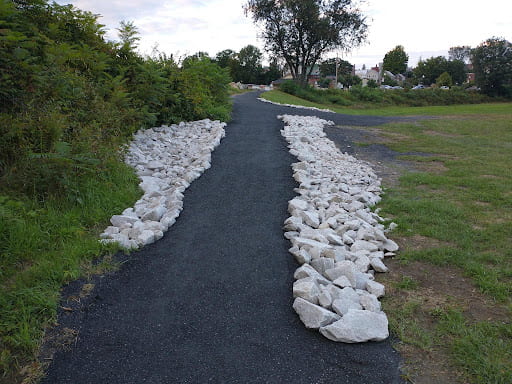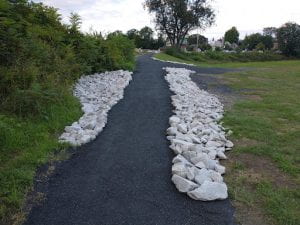Dec 16, 2021 | Exclusive, Feature, News |
By Adrienne Foss, contributing writer
Student Karly Jacklin is currently in her third year at UMF and has worked hard to help form UMF’s first Jewish Student Union (JSU). The JSU became official on Monday, November 22.
The idea for a Jewish Student Union came from Jacklin, Jocelyn Royalty, Molly Ondich, and Professor of Philosophy Jonathan Cohen, who all became close over the past year. First-year student Ondich wanted to know if there was a JSU on campus and decided to take the opportunity to form one.
“We all were meeting at a Tashlich ceremony which is when you throw bread in the water to cast off sins for the Jewish New Year,” said Jacklin. The ceremony was an event held by Franklin County’s Jewish Union, which is known to its members as the Bagel and Dreidel Society.
“I’ve been hoping for one since I came to UMF in 1992,” said Cohen. “We’ve come close before, but never quite had the critical mass of sufficient students or the impetus of committed leadership to pull it off. I’m very happy that those conditions have finally been met…We’ve had a smattering of Jewish students at UMF every year that I’ve been here, and their number has been growing gradually over time.”
When trying to get the Union started, there proved to be challenges in getting approval from Student Senate. The first hurdle Jacklin went through was expanding the membership requirements.
“We couldn’t just keep it for Jewish students and allies if we wanted to get senate funding, and we had to take that out of our Constitution which we worried a little bit about,” said Jacklin. The constitution committee of the student senate said that it would be okay and assured that there would not be any anti-Semitism. If any anti-Semitism was to take place, it would go directly against the Student Code of Conduct.
The first meeting for the proposed JSU took place over Zoom on October 20, and a total of six people showed an initial interest. More people have been showing an interest in the Union since then, and more have gradually been joining.
“The main thing we are trying to do is connect Jewish students to the Jewish resources in the Farmington Area,” said Jacklin. “We just want to serve as the bridge between the Franklin County Jewish community and the students here at UMF… I’m a junior, and I had no idea that there was a Jewish group in Franklin County until I took a class with Professor Cohen…We have had discussions about going to Augusta or Waterville to go to one of the Synagogues there for more outreach.”
“I look forward to current and future Jewish students having an opportunity to connect with fellow Jewish students while in college,” said Cohen. “It’s an age at which people are figuring out their identities now that they’re no longer subject to the families they were raised in, so having the opportunity to explore their Jewish identity with fellow students in the same situation is really important for them… The club belongs to the students, so they can do with it whatever they like. I’ll be happy to work with them in whatever capacity they would like, and I look forward to doing so. It’s an exciting development!”
“People do continue to reach out to me, so the union is definitely growing,” said Jacklin. “It’s a small community here, but I think it’s going to flourish.”
If anyone has any interest in joining the Jewish Student Union, contact karly.jacklin@maine.edu.
Dec 16, 2021 | Exclusive, Feature, News |
By Adrienne Foss, Contributing Writer
Assistant Professor of Music Composition Aaron Wyanski recently joined UMF during the 2020 school year and has since been making extensive contributions to the music department.
“On one of my first days, I was asked what kind of classes that I wanted to teach during the semester,” Wyanski said. “All of the classes that I pitched ended up actually happening, which is new for me and I find very exciting.” He currently teaches three classes a semester, along with the piano lessons he provides to a select number of students.
“I like how interdisciplinary the arts division is here and how easy it is to interact with people all around campus,” Wyanski said. “Sometimes music can be really siloed, which is definitely not the case here.”
Wyanski has been teaching instrumental lessons for almost 20 years and has been teaching composition for five. He has had previous teaching experiences at The Hartt School, which is connected to the University of Hartford, along with Sweet Briar College located in Virginia.
“One of my missions in education is to make sure that no one should feel bad for not knowing something,” Wyanski said. “Very often in music, people feel intimidated to try something new in fear that they might make a mistake.”
Wyanski started to gain an interest in music when he was an early teenager, and he started out by playing the guitar. At the time he was more of a visual arts person, but he soon began to realize he wanted to pursue a career in music. At the age of 18, Wyanski became an early admission student at a local New York community college where he began to learn how to play the piano.
Between getting his undergraduate and his master’s degree, Wyanski took a lot of time off and focused on working as a musician. After going to graduate school for music composition, he eventually realized that he wanted to pursue a career as a music educator.
“I’m consistently impressed with the students here, which is a big part of my inspiration when it comes to teaching,” Wyanski said. “For me, teaching has always been so much more about teaching people rather than only teaching a subject.”
“Part of what I’m here [UMF] to do is to make new things happen,” Wyanski said. “It’s a challenge in its own way, but I get to figure out what makes sense for the music program here.”

Sep 27, 2021 | Feature, News, Sports, TopStory |
By Adrienne Foss, Contributing Writer.


A pre-existing trail surrounding Prescott Field has recently been extended by over half a mile to meet the Americans with Disabilities Act standards and regulations. The highly trafficked trail is used by people all around the community, and the adaptations made will benefit nearly 40% of the Franklin County population according to project organizers.
The High Peaks Alliance is a non-profit organization that played a vital role in the creation of this trail. The organization wanted to know how they could improve the overall accessibility of this piece of land that so many people were already enjoying.
“We realized that there were no accessible trails in all of Franklin County,” Executive Director of the High Peaks Alliance Brent West said. He believes that more people need to get outside and to feel comfortable in the environment they’re in, and having safe and accessible trails is one of the first steps towards meeting that goal. “We hope that the work we do allows for more people to have more opportunities,” West said.
Gina Oswald has worked as a professor in Rehabilitation Services for three years at the University of Maine at Farmington. She has been working for and with people with disabilities for nearly 22 years, and she is always looking for ways to improve general accessibility and to remain inclusive. Oswald has also been a board member of the High Peaks Alliance since 2020 and has since been making extensive contributions to the accessibility aspects of the community. She has worked closely with West to see that this project comes to life. “Being in the field for so long, not only does it keep me passionate about these things, but it keeps me informed about what is and isn’t accessible for all,” Oswald said. “The world is a better place when everybody has the same opportunities and access.”
The ADA trail received funding and grants from multiple organizations in Maine, including the High Peaks Alliance and the Northern Forest Center. The Northern Forest Center provided a $50,000 grant to go towards the project, and the High Peaks Alliance fundraised the rest of the cost. The project added up to a total of $96,000.
The trail now extends from Front Street to the Narrow Gauge parking lot, and it consists of crushed natural and local rock that gives the appearance of smooth pavement. This now provides a safer and more reliable surface for people using a wheelchair, walker, or stroller. There was also a concerted effort to include braille, sign language, and tactile, along with other languages like French and Wabanaki on the informational signs around the trails.
The High Peaks Alliance is constantly seeking additional funding for future projects, and there are big plans for both the Farmington area and Franklin County as a whole.
“We have smaller local goals along with bigger and more grand hopes and dreams,” Oswald said.


